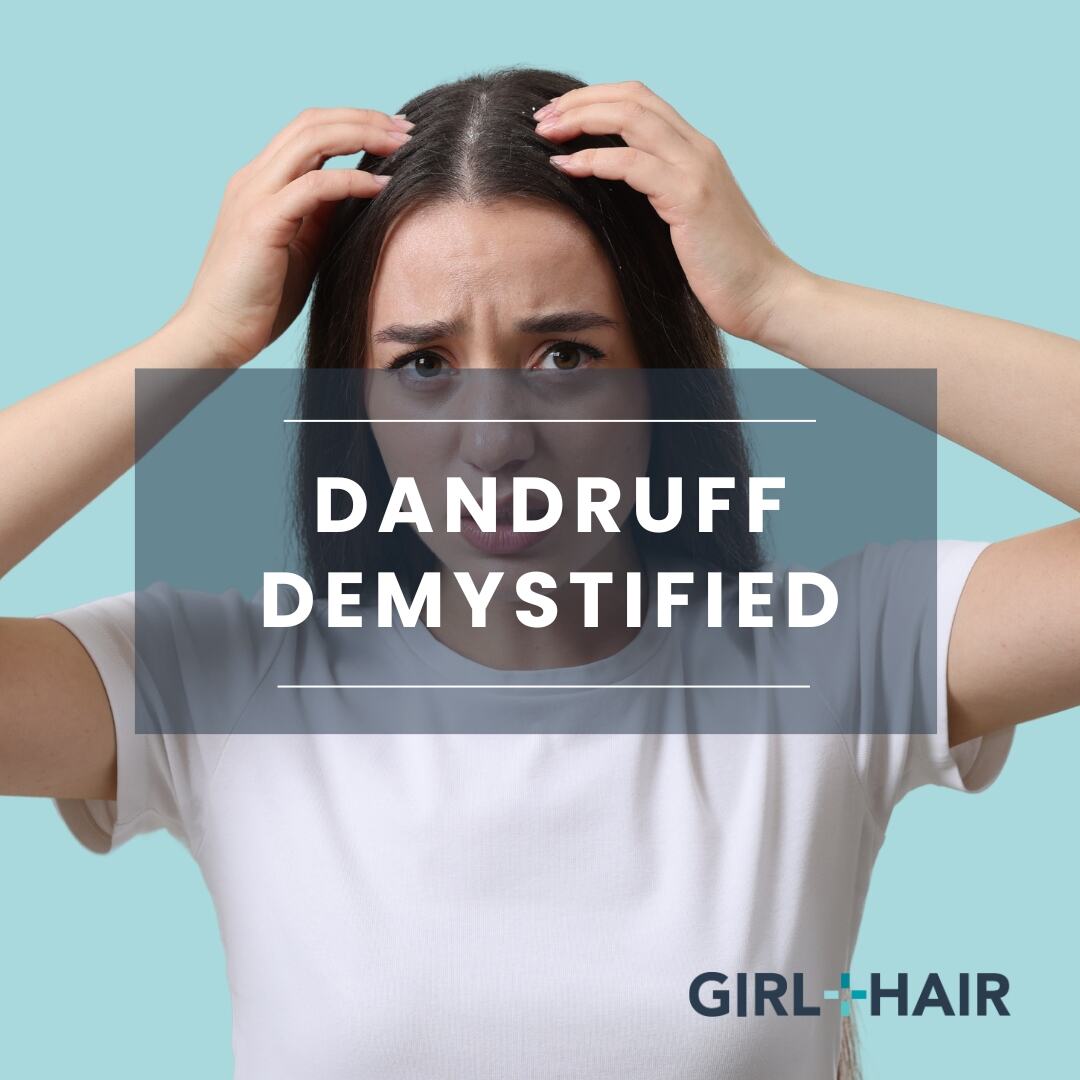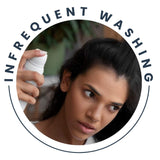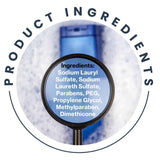
|
What's in the Article? |
Dandruff is a common scalp condition that manifests as loose, white scales or plaques, usually affecting the scalp. It can be caused by multiple factors and come about at any time in your life and is often something to be embarrassed about. Not to stress you out, but dandruff can happen to anyone and it can evolve into a more severe type of dandruff called seborrheic dermatitis if left untreated. Dandruff has nothing to do with hygiene and can affect people of all ages and at any time. That means you can go years dandruff-free for it to appear seemingly out of nowhere.
In this comprehensive guide, we'll explore the mysteries of dandruff, decipher the sudden onset of this scalp concern, and provide dermatologist-backed solutions, courtesy of GIRL+HAIR.
 What is Dandruff?
What is Dandruff?

Dandruff is a common scalp condition characterized by the presence of loose, white scales or plaques on the scalp and sometimes in the hair. It is often accompanied by itching and can occur due to various factors such as dry skin, oily skin, fungal infections, or inflammatory skin conditions. Dandruff is not contagious or harmful, but it can be persistent and cause discomfort or embarrassment for some individuals. If left untreated, it can evolve into a more severe type of dandruff called seborrheic dermatitis, which is characterized by red, inflamed skin and more stubborn scaling. Therefore, addressing dandruff early on is essential to prevent it from progressing into a more serious condition.
Do I have Dandruff or Dry Scalp?
Distinguishing between dandruff and dry scalp can be tricky, as they share similar symptoms. Dry scalp is caused by a lack of moisture on the scalp, leading to itching and flakiness. On the other hand, dandruff is often accompanied by greasy, oily patches on the scalp and is caused by a yeast-like fungus called Malassezia.
“If you're unsure which one you have, I recommended consulting a dermatologist for a diagnosis,” says Dr. Camille Howard-Verovic, board-certified dermatologist and founder of GIRL+HAIR. “It's essential to address dandruff early on to prevent it from progressing into a more serious condition,” says Dr. Howard-Verovic.
Why Do I Suddenly Have Dandruff?
The sudden onset of dandruff can be attributed to various factors, including changes in weather, stress, hormonal fluctuations, and certain hair care practices. Additionally, exposure to harsh chemicals or allergens can trigger dandruff flare-ups. Dr. Camille Howard-Verovic explains, "sudden dandruff can occur due to a variety of factors, including an overgrowth of yeast on the scalp, hormonal changes, or even stress. It's essential to identify the underlying cause to effectively address the issue."

You're Washing Your Hair Too Infrequently:
Infrequent hair washing can lead to a buildup of oil, dead skin cells, and product residue on the scalp, creating an ideal environment for dandruff-causing fungi to thrive. Aim to wash your hair regularly, but not excessively, to maintain scalp health and prevent dandruff flare-ups.

You're Washing Your Hair Too Frequently:
On the flip side, washing your hair too frequently can strip the scalp of its natural oils, leading to dryness and irritation. This can disrupt the scalp's natural microbiome and exacerbate dandruff symptoms. Find a balance in your hair-washing routine to keep your scalp clean without over-drying it.

Certain Styling Products Are Working Against You:
Some hair styling products contain ingredients that can exacerbate dandruff, such as silicones, heavy oils, and waxes. These ingredients can weigh down the hair, trap moisture on the scalp, and contribute to dandruff formation. Opt for lightweight, noncomedogenic styling products that won't clog the pores or exacerbate scalp issues.

You're in a Hot, Humid Environment:
Hot and humid environments can increase sweating and oil production on the scalp, creating an ideal breeding ground for dandruff-causing fungi. Additionally, humid conditions can exacerbate scalp inflammation and irritation, leading to dandruff flare-ups. Keep your scalp clean and dry, especially during hot and humid weather, to prevent dandruff.

Your Diet Is Off:
Your diet plays a significant role in overall scalp health and dandruff prevention. Certain dietary factors, such as consuming excessive sugar, processed foods, or dairy products, can trigger inflammation and contribute to dandruff formation. Conversely, incorporating nutrient-rich foods like fruits, vegetables, and omega-3 fatty acids can support scalp health and reduce dandruff symptoms. Ensure you're maintaining a balanced diet to support healthy scalp function and prevent dandruff.
Understanding these potential triggers can help you identify the underlying cause of your sudden dandruff and take proactive steps to address it. By addressing the root cause, you can effectively manage and prevent dandruff for healthier, happier hair and scalp.
What Ingredients Help with Dandruff?


The good news is that there are several products to choose from and many are available over the counter. These products “contain ingredients that decrease inflammation, treat yeast overgrowth on the scalp, and help with exfoliation of the scale", Dr. Howard Verovic says. I.e. apple cider vinegar is an ingredient, known for its antimicrobial properties, helps rebalance the scalp's pH and reduce inflammation. Also, Tea tree oil possesses antifungal and antibacterial properties, making it an excellent natural remedy for dandruff. Salicylic acid exfoliates the scalp, removing dead skin cells and reducing flakiness.
How to Cure Dandruff Permanently:
While dandruff can be managed effectively with the right products and hair care routine, curing it permanently may require ongoing maintenance. Incorporating a regular scalp care regimen, including cleansing with anti-dandruff or clarifying shampoos, maintaining scalp hydration, and avoiding triggers such as stress and harsh chemicals, can help prevent dandruff flare-ups and promote long term scalp health.
Introducing Girl+Hair Clear+ Clarifying Apple Cider Vinegar Hair Rinse:
GIRL+HAIR's Clear+ Clarifying Apple Cider Vinegar Hair Rinse harnesses the power of apple cider vinegar and tea tree oil to effectively combat dandruff and promote a healthy scalp. This clarifying hair rinse gently removes buildup, balances the scalp's pH, and soothes irritation, leaving your hair feeling refreshed and revitalized. Dr. Howard Verovic recommends, "Incorporating a clarifying rinse like GIRL+HAIR's Clear+ ACV Hair Rinse into your hair care routine can help alleviate dandruff and maintain scalp health."
Don't let sudden dandruff derail your confidence and comfort. By understanding the causes of dandruff, distinguishing it from dry scalp, and incorporating targeted ingredients like apple cider vinegar, tea tree oil, and salicylic acid, you can effectively manage and treat dandruff. Consider adding GIRL+HAIR's Clear+ Clarifying Apple Cider Vinegar Hair Rinse to your hair care arsenal for a dandruff-free scalp and healthier hair.
For more information on how to use apple cider vinegar on hair, please read our popular blog post: An Ultimate Guide to Clarifying Hair with Apple Cider Vinegar.

